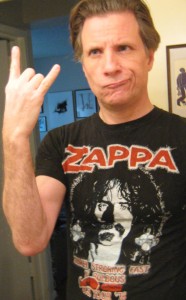So, You Want to Conduct an On-Camera Interview…
I don’t usually do how-tos, but a few times in the past year I’ve been approached by people who want to make a documentary and they always ask me, among other things, how to conduct an interview. This surprises me, because it seems like this is intuitive, but maybe not. So, for you future documentary filmmakers out there, here are some pointers.
Research
In order to ask informed questions, you first have to be informed. So read up on your subject and their passion. If they’ve written books or articles, read them. If they’ve been on TV or been written about somewhere, track those down and watch and read. There is an irony here: when I interviewed Robert Darden of the Black Gospel Music Restoration Project for A Life’s Work, I had to ask questions that elicited answers that would give all the relevant information to a viewer who had no knowledge of gospel music, its importance, and why its recorded history is disappearing.
Be Prepared
Make the big decisions well before you even set up the interview. Will the subject be interviewed “portrait” style, that is, sitting in a chair opposite you in a controlled environment? Or will you conduct the interview while you both sit atop a mountain? Will you be seen asking the questions on camera? Will you be heard asking the questions? If not, make sure to tell your subject to restate the question in their answer. (People are more adept at this then they realize.) How will you light the subject? If you found the perfect spot on a Sunday afternoon, nice and quiet, say, and you’re interviewing on a Monday at 3 pm, go back on a Monday at 3 pm. The last thing you want is to discover that there’s a schoolyard beside that space and it’s swarming with screaming hyperactive kids right when you’ve scheduled the interview.
Organize Your Questions
I like to start off with simple, biographical information, and I will often ask the subject to state his/her name and title. Then move on to how they became interested in the thing they do. This is the easiest ground to cover and it relaxes them and you. When it comes to the more complex stuff, start broad and get specific. Save the hard-hitting questions for last.
Professional

Dress so you don’t call attention to yourself. For example, don’t wear your Frank Zappa concert T-shirt, complete with the cryptic lyric “zorch stroking fast n’ bulbous” and a lone baby doll’s leg. A plain solid shirt and jeans will do. The idea is to be as invisible as possible. You don’t want your clothes to distract the subject.
Also, greet your interviewee and make small talk, but don’t engage them in your interview topic until they are in front of the camera and you’re rolling. Often an interviewee will start talking about the topic before you’re ready. Politely ask them to save it for the camera, explaining that the first time they tell a story is usually the best. Everyone can relate to this, but we could all use reminding from time to time.
Comfort
Make sure the subject has water nearby. Give them a comfortable chair to sit in, but one that doesn’t swivel and doesn’t invite slouching. (Unless you’re interviewing a rock star, in which case all the rules go out the window.) I tell them that I am inarticulate at times, and if they don’t understand a question, just say so and I’ll try again. Let them know that if they are unsatisfied with their answer, they can stop any time and start over. I’m not making an investigative film, so I don’t pry too much into the personal. I let my subjects know if they don’t want to answer a question, they should just say so.
